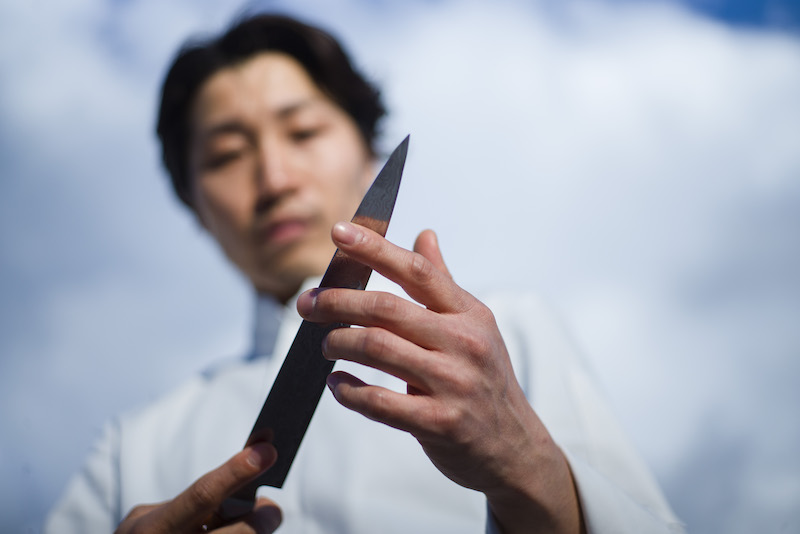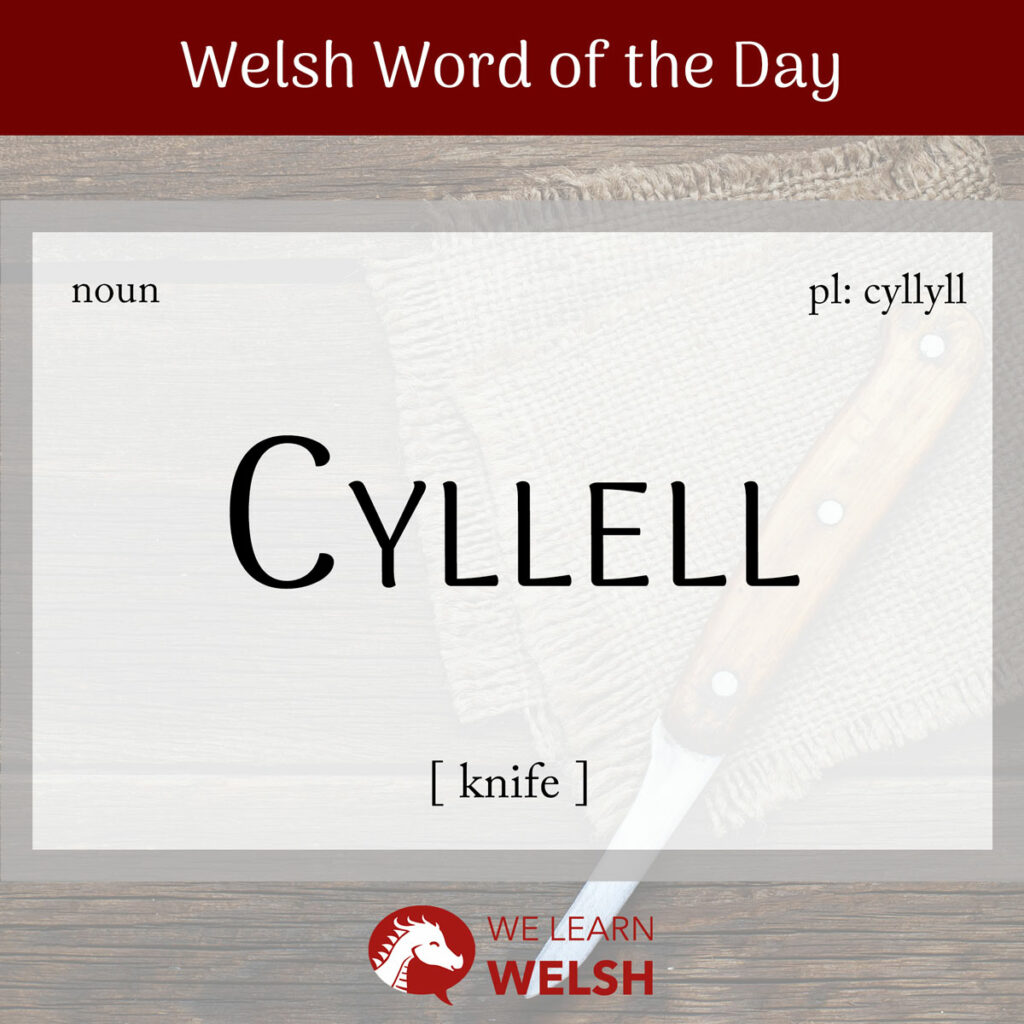Today’s Welsh word of the day is the simple cyllell (knife), the plural of which is cyllyll (knives). This can be used to describe a llafn (blade) for combat, hunting, or craftsmanship, but in most people’s lives, cyllyll most often come in handy in the cegin (kitchen).
cyllell
knife
If you’re a new Welsh speaker and you’re balking at the sight of a word with two double LL sounds in it, never fear! You can make things significantly easier by going with the variant cylleth. This is just a slangy regional variation popular in various parts of the country, but it has the added benefit of being significantly easier to say for those who struggle with the dreaded LL.
Another common difference in how the word is pronounced is that in North Wales it may be changed from cyllell to cyllall.
This doesn’t just apply to this word – it’s really common in North Wales to change the final vowel of a word from e or y to a. You can see it even in really basic phrases, like dych chi (you are), which most Northerners will pronounce as dach chi.
On the other hand, down in South Wales, the most common way to switch up cyllell is to pronounce the y in the first syllable like the i in English kin. It’s not uncommon for y to make this sound in Welsh, but it happens more often in the final syllable of a word.
Plurals vary too – cyllyll is the most common and considered the most correct, but you may come across cylleill or cyllaill too.
Wnaethon ni brynu’r cyllyll newydd ‘ma ar gyfer y gegin.
We bought these new knives for the kitchen.
So, are you wondering where this word comes from? It’s yet another borrowing from Latin! It appeared in proto-Brittonic as something like *kullell, but its original form was the Latin cultellus, meaning small knife or dagger. This word is also the ancestor of the English cutlery and the Italian coltello (knife). Isn’t it amazing how such different languages can have so much in common?
Since cyllell is a feminine noun, you’ll need to give it a soft mutation after the definite article, and adjectives placed after it will mutate, too. This means the sharp knife translates to y gyllell finiog.
Soft mutation
gyllell
Nasal mutation
nghyllell
Aspirate mutation
chyllell
My knife is fy nghyllell, and a fork and a knife is fforc a chyllell. Though just like in English, most people go for cyllell a fforc!
Defnyddiwch y gyllell a’r fforc i fwyta.
Use the knife and fork to eat.
Now, what I’ve learnt from writing this article is that there are more kinds of cyllell in the world than I ever knew existed. Check out some of these:
- cyllell fara / twca bara = bread knife
- cyllell gaws = cheese knife
- cyllell bysgod = fish knife
- cyllell gigydd = butcher’s knife
- cyllell gerfio = carving knife
- cyllell fwyta / cyllell fwrdd = dinner knife
- cyllell lif = serrated knife
- cyllell hela = hunting knife
- cyllell boced / cyllell goden = pocket knife / pen knife
- fflaim / cyllell meddyg = surgical knife
You might have noticed in the above list that not all knives are necessarily cyllyll. Aside from twca and fflaim, another kind of knife is a dagr (dagger). And of course, a big dagger quickly becomes a mighty cleddyf (sword)!
The llafn (blade) of a cyllell is made of metel (metel), such as efydd (bronze), dur (steel) or titaniwm (titanium). The handle, on the other hand, might be made of pren (wood) or simple plasteg (plastic).
I’ve found that having good quality cyllell with sharp llafnau (blades) makes a real difference to the ease of cooking – though of course, you have to make sure you have a good bwrdd torri (chopping board), too.
Am niwsans! Mae fy nghyllell fara’n swrth.
What a nuisance! My bread knife is blunt.
Aside from the erfyn (tool) itself, there are a lot of different choices to describe exactly what you might do with a knife in Welsh. This is because there isn’t really a direct equivalent of the English verb cutting. Here are some options, of which torri is the go to if you do need to translate cutting.
- torri = breaking
- cerfio = carving
- malu = grinding / shredding
- tafellu = slicing
- trychu = cutting in a surgical context
- trywanu = stabbing
- tocio = trimming
- difynio = dissecting / cutting to pieces
One verb that isn’t really in common use for the average person is ysbaddu, which means to castrate. I mention it because it features in one of the most amusing Welsh idioms featuring cyllell, which is cyllell ‘sbaddu malwod (a knife for castrating snails). It’s used in a joking way to describe something completely useless, like a chocolate teapot in English. The more you know!


